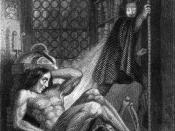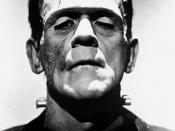Forever Outsiders
Isolation is a common human tendency that society uses to deal with a stressful situation. In the horror novel, Frankenstein, by Mary Shelly, Victor Frankenstein is a scientist who is obsessed in discovering a secret of giving life. He creates a monster that seeks revenge against Victor for isolating him from society which results in the deaths of Victor's brother, his best friend and his wife. Throughout Mary Shelley's Frankenstein, rejection and seclusion are recurring elements that continually intertwine to form a theme of isolation. Victor Frankenstein lives in isolation from society while alienation forces the monster to act in violent ways. Finally, the two characters, Victor and the monster, meet a secluded man in the Arctic, Walton, as he continues his expedition in the North Pole. In the novel, Frankenstein by Mary Shelley, the author alienates the three main characters in the novel, Victor, Walton and the monster in order to reveal their character and the society in which they are part of.
Alienation is something Victor experiences his entire life, during his childhood, family, scientific work, and society. Victor Frankenstein is a man of science and his goal in life is to follow his dream of understanding the miracles of the world. He spends almost his entire time recreating life in the form of a monster. However, he is not aware of the consequences that he will face. Because of this, Victor spends the rest of his life trying to destroy the same creation he tried so hard to create. During his period at the university where he designs his experiments, Victor separates himself from society and devotes all his time and effort to the desire of knowledge. Over time, he adopts a fascination for science and eagerly begins to educate himself:
I was, to a great degree, self taught with regard to my favorite studies. My father was not scientific, and I was left to struggle with a child's blindness, added to a student's thirst for knowledge. (38)
Instead of finding friends or communicating with his family, he locks himself up in his room studying, not being bothered about being alone. Moreover, Victor chooses to set up his laboratory "in a solitary chamber, or rather cell, at the top of the house" (52) in Ingolstadt as a replacement for the school's laboratory. It is a self imposed division he chooses due to the fact of his scientific experiments. He stays in his laboratory creating the monster, even though he has not seen his family for a long time. Even if Victor chooses isolation, he many times insists that the only reason he is isolated is because of the creature:
I must absent myself from all I loved while thus employed. Once commenced, it would quickly be achieved, and I might be restored to my family in peace and happiness. (147)
At first Victor is separated because of the creation of the monster and then, subsequently, because of keeping the secret of his creation. The experiment forces Victor to alienate himself from society and his family as a means of protecting fellow creatures from the monster. At the end of the experiment, he understands the consequences that arise from it and he is forced to alienate himself from the entire world while attempting to destroy his creation. The only communication Victor has with anyone else throughout the novel is with Walton at the ship. He confesses to Walton the story of his life and about the creature he has created. Victor is also alienated from his surroundings because of his choice of scientific viewpoints. The evidence is apparent; Victor chooses to alienate himself from others, friends, school, and family.
The theme of alienation is also shown through Victor's creation. Unlike its inventor, the monster does not choose to be separated. Rather it is, in fact, others who isolate it because of its hideous appearance. All the monster wants is to be loved, but after many attempts to fit into society, it realizes that it will never be accepted by humans. The first experience with the world is when the creature opens its eyes, and sees Victor's scared look. The monster's own father rejects it even though he created it; "unable to endure the aspect of the being [he] had created, [he] rushed out of the room and continued a long time traversing [his] bedchamber, unable to compose [his] mind to sleep" (55). The monster is left all alone with no information about where it is, who it is, and is like a new born child left alone in the enormous world. The second experience the creature has with humans is by contact with the villagers, where they throw stones at it to make it leave them.
I had hardly placed my foot within the door before the children shrieked, and one of the women fainted. The whole village was roused; some fled, some attacked me. (Shelley 101)
The rejection of the DcLacey family is the creature's third experience with humans. This is the first family that it comes in contact with, and also wants to be a part of. Because of its previous experience with humans the creature decides to hide, and secretly observe the family. The creature finds out "that these people possessed a method of communicating their experience and feelings to one another by articulate sounds" (107).The creature believes that the language is "a godlike science" which will help it to be accepted; therefore, it learns the language by observing the DcLacey family (108). The monster also believes that if it could tell the blind father its story, it would be accepted by their family; however. The monster is interrupted by the children when they enter the house, and in fear for their father's life, they react by forcing the creature away with violence Once more the creature is rejected because of its hideous form. The family symbolizes the creature's first "school" of human nature. The lesson that the monster learns is that it does not fit in. The monster is not alienated in this novel once, but instead three times. Because of this alienation, he retaliates and causes violence within the society.
Robert Walton separates himself from society through his journey to the Arctic. Walton chooses, like Victor, isolation with his expedition; but on the other hand, Walton also longs for companionship. He is the balance between Victor, who isolates himself from society, and the creature, which yearns for nothing but to be a part of the society. Walton is someone who can strive for distinction but at the same time turn back when his actions might harm others. Unlike Victor, he is capable of seeing the result of his desire for knowledge. Walton is willing to cancel his expedition when the ship's crew wants to return home because of the dangerous journey. Walton's entire childhood was spent in loneliness, as he educated himself in a similar way to Victor. Another parallel reference to Victor is that Walton also chooses isolation because of his lust of knowledge.
There is a love for the marvelous, a belief in the marvelous, intertwined in all my projects, which hurries me out of the common pathways of men, even to the wild sea and unvisited regions I am about to explore. (20)
Isolation can also be viewed as to an explanation for Walton's desire to go on an expedition "to unexplored regions" far away from civilization (19). The only exception to Walton's isolation in comparison to Victor and the creature is the communication Walton has with his sister, Mrs Saville, in his letters. All in all, the isolation that Walton experiences is the balance between the alienation that the monster experiences and the isolation that Victor gives himself.
The theme of alienation is without a doubt one of the most important theme in Frankenstein. Alienation is the common denominator between the three main characters. Victor Frankenstein is perhaps the only character that chooses alienation by himself because of his desire for knowledge. In the end Victor becomes the prisoner of his own creation. The monster, on the other hand, is greeted with disgust and violence even though it comes with friendly intensions. Subsequently, it is forced into alienation in order to survive, and becomes the savage that mankind believes it is. The third character, Robert Walton, represents the healthy human being and the balance between Victor and the monster. Walton has a good and bad side which also can represent Victor's bad side and the monster's good side. Both these aspect represent the healthy human being. The characters in Frankenstein are all victims of alienation and loneliness. None of them have chosen by themselves to be in this situation. They are victims because of the actions of others and these actions have subsequently left them in the grip of isolation.
Works Cited
Shelley, Mary. Frankenstein. New York: Signet Classic, 1963


